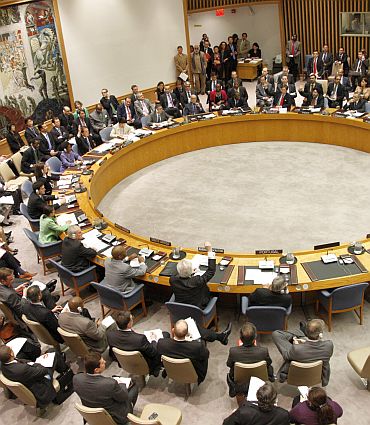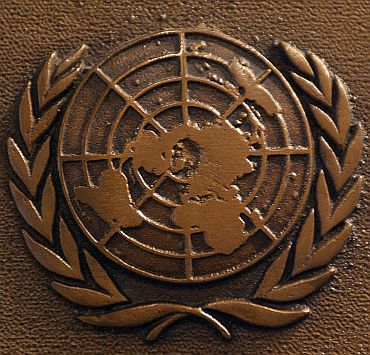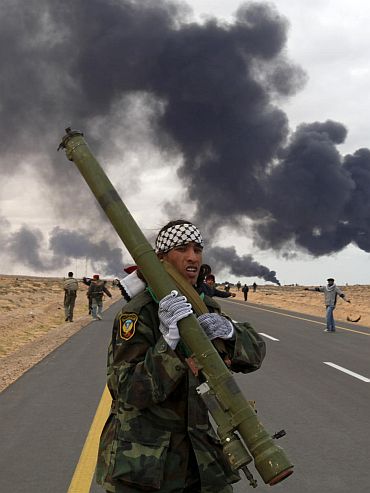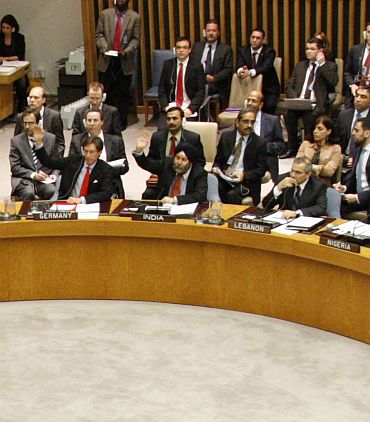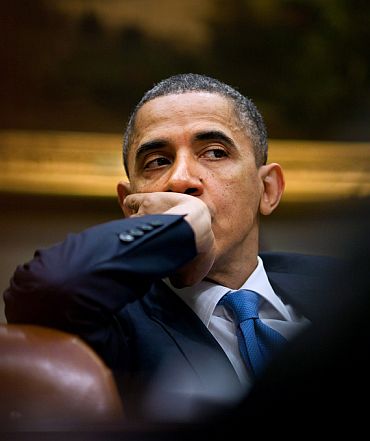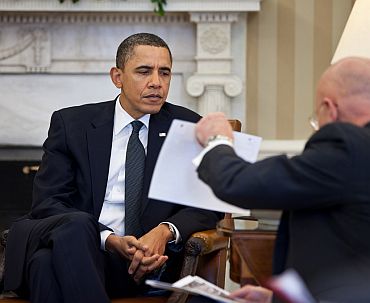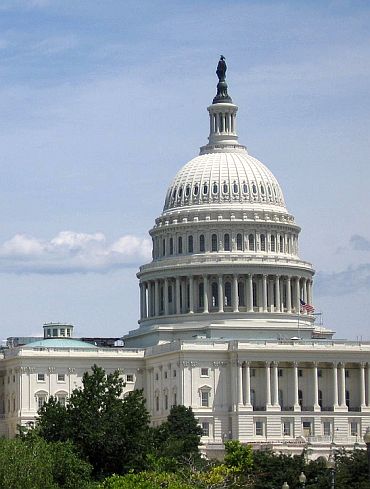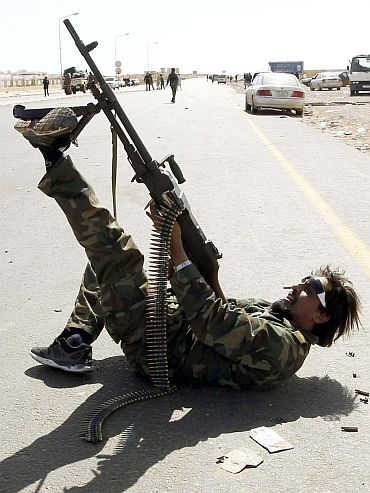 | « Back to article | Print this article |
'Great powers have to make choices'
Noted American experts on South Asia have ridiculed New Delhi for its decision to abstain on the United Nations Security Council resolution 1973 calling for a No-Fly Zone in Libya.
In interviews with rediff.com, experts argued that in many ways it was a sense of deja vu all over again vis-a-vis India's voting patterns in the United Nations on major issues and its anachronistic non-aligned bent where New Delhi retreats to assume 'weak and safe positions' particularly where its leadership as a democratic and emerging power is required.
The first salvo against India's decision to abstain was fired by Dan Twining, senior Fellow for Asia at the German Marshall Fund of the United States and also a consultant to the administration on international security affairs.
In an article in Foreign Policy, Twining, also an erstwhile foreign policy adviser to US Senator John McCain, wrote, "Great powers have to make choices in international affairs -- it is what makes them great powers. India's abstention in the Libya votes disappoints its many American friends who supported President Barack Obama's call last November for a permanent Indian seat on the Security Council."
Click on NEXT to read further...
'A deep disappointment'
"India's current two-year UNSC rotation was always going to be a litmus test of New Delhi's ability to be a constructive player at the high table of world politics, from which India was excluded for 60 years," he said.
Twining argued that "it is ironic that India -- which intervened in what was then East Pakistan in 1971 to prevent a civilian bloodbath in Bangladesh's independence struggle, intervened in Sri Lanka in 1987 for similar reasons, and has played a crucial role supporting democratic solutions to civil conflicts in Nepal, Afghanistan, and elsewhere -- decided that the same values of democracy and human rights that govern its own society are not for New Delhi to protect and advance elsewhere."
In an interview with rediff.com, Twining said, while he wouldn't call India's decision to abstain, particularly after President Obama had gone out on a limb and become the first US president to publicly endorse India's bid for a permanent seat in the UNSC, "a betrayal," it was indeed "a deep disappointment for those of us who believed that with India now as a member of the Security Council, would exercise a leadership role on issues like that."
'India has not moved away from the India of old'
"That India would move away from the India of old where it wouldn't take decisions but would simply be weak and retreat to a safe route and abstain or vote against such humanitarian resolutions," he said.
Twining said that here was a no-brainer, where Libyan leader Muammar Gaddafi's forces were on the verge of massacring civilians in Benghazi and even the Arab League and the United Arab Emirates had also voted and supported a No-Fly Zone, and that it was expected that India, which has such close relationships with these Gulf and Arab nations would have voted in favour of the resolution, instead of once again showing "the old weakness."
He said it was "laughable" that India resorting to the "long speeches of old it used to be known for," had resorted to a cop-out in arguing that there wasn't sufficient information for the action the Security Council Resolution was calling for and hence unwarranted at this particular time.
Twining said all of the information and intelligence was out in the public domain regarding Gaddafi's loyalist forces indiscriminately killing civilians and preparing for an assault on Benghazi, the rebels stronghold and Gaddafi himself declaring that there would be 'no mercy' shown towards these dissidents.
India complained that there was no clarity
During the debate that preceded the vote where nine votes were needed to pass the resolution, and 10 countries votes yes for it and India abstained along with Russia, China, Brazil and Germany, India's Deputy Permanent Representative Manjeev Singh Puri, said, India's couldn't endorse the resolution without first hearing from the UN Secretary General's own special envoy, former Jordanian foreign Minister Abdellah Al-Khatib, who had only just visited Libya.
Puri said, "The UN Secretary General has appointed a special envoy, who has just visited Libya. We have not had the benefit of his report or even a report from the Secretariat on his assessment as yet. This would have given us an objective analysis on the ground."
"We must stress the importance of political efforts, including those of the Secretary-General's special envoy to address the situation," Puri added.
He also complained that there was no clarity contained in the resolution as to how the No-Fly Zone would be enforced and "who and with what assets will participate and how these measures will be exactly carried out."
'Obama's public endorsement for India could dissipate'
Twining warned that "India's behaviour" on the Security Council, would now "be closely monitored" by the US, including by those in the US Congress, including the majority of lawmakers who were strong supporters of India and had voted in favour of the US-India civilian nuclear deal and also always endorsed India's bid for a permanent seat on the UNSC.
But he noted that such abstentions by India would necessarily dilute Congressional support for India's bid for a permanent seat when UN reform finally called for an expansion of the permanent seats, and said the endorsement that Obama publicly made could also dissipate.
Twining ridiculed the argument that India may have abstained because it may have believed that it should not antagonise either China or Russia, whose support is vital for its permanent seat aspirations.
He said, he couldn't understand such myopia, if it indeed was India's rationale for abstaining because unlike in the case of Brazil, with which New Delhi is cultivating a relationship as both are emerging economic powers, China "is India's peer competitor," and showing a kind of assertiveness in the regional inimical to India's interests, "and Russia is such a waning power."
'However disappointing India's abstention may be, it was not surprising'
Hence, Twining argued, it was only to be expected that India would have been true to its values and voted with its "more democratic allies," in the Security Council on an issue, which was such a straightforward humanitarian emergency.
However, he acknowledged that the early waffling by the Obama administration on taking a leadership role may have given India mixed signals, and noted that he was aware of discussions between US officials and their Indian counterparts where Washington had indicated that it was not going to be in the lead in terms of action against Gaddafi, but then turn a complete U-turn on that policy.
Ashley Tellis, formerly a senior official in the George W Bush administration who was intimately involved in then negotiations of the US-India civilian nuclear deal and a strong proponent for US endorsement of India's candidacy for a permanent seat in the UNSC, said, "However disappointing India's abstention may be, it was not surprising."
Tellis, currently a senior associate at the Carnegie Endowment for International Peace, argued, "India's position reflected its strong desire to uphold the principle of state sovereignty because of its fears that weakening this principle could leave India one day at a disadvantage vis-a-vis the international community."
'India's stance reflected lack of confidence in its own power'
"What India's stance reflected, in my opinion, was its still considerable lack of confidence -- in itself, in its own power, and in its ability to make a difference," he added.
Tellis said that by abstaining and not voting in favour of the resolution, for India, "It was an opportunity missed, indeed. But playing it safe is what weak states do. States that have ambitions to play a global role obviously behave differently -- that India didn't demonstrate that there is still a lag between India's steadily growing material capabilities and the psychological disposition to use those capabilities in affirmative ways that advance its interests."
He said he didn't believe that India by abstaining, wanted to be in Russia and China's corner, but that 'the abstention was driven by a fear of weakening the principle of sovereignty'.
"But the unfortunate outcome was that India's abstention placed it in a league with other -- appearances notwithstanding -- weak or illiberal states. The more regrettable upshot was that India lost an opportunity to affirm a higher principle: that unrepresentative regimes that war against their own people are illegitimate political orders and must be confronted by the international community."
'It is a pity that New Delhi did not act as it did in 1971'
Tellis said, "It is a principle that India went to great pains to espouse in March-October 1971 and it is a pity that New Delhi did not act in accordance with this principle in the case of Libya -- a country that was chastened by the Arab League itself and to which India owes nothing on grounds of interest."
Asked if this abstention would now give the US and particularly, India's supporters on Capitol Hill to have second thoughts about India as a permanent member of the UNSC, Tellis did not believe this would have such a consequence.
"I don't believe this vote will give supporters of India second thoughts, but it will certainly disappoint those who believe that India is different among all developing countries and could lead by force of example."
He did not believe this would take away from the envisaged strategic partnership of India as a natural ally, which would be relied upon as a reliable partner either, arguing: "I don't think this vote undermines the case for the strategic partnership necessarily."
'Position on Libya serves the domestic interests of the Congress party'
Tellis said, "In ordinary circumstances, India would find no stronger partner than the United States in its defence of state sovereignty. But there are occasionally situations -- and the Libyan case was one of them -- when the defence of sovereignty must give way to the imperative of protecting innocent life. To affirm this imperative, however, requires both power and confidence. India's non-committal position at the UNSC suggests that it lacks both currently."
Lisa Curtis, head of the South Asia Programme at the conservative think tank, The Heritage Foundation, said: "The Indian position against the US-France-UK military action to enforce a no-fly zone in Libya demonstrates that it is easier for New Delhi to revert to its traditional non-interventionist foreign policy than to risk staking out new positions that might reflect a growing leadership role in world affairs."
"The Indian government position on Libya serves the domestic interests of the Congress party, which is already under pressure from a series of corruption scandals and the recent publishing of Wikileaks cables that detail the increased closeness between Washington and New Delhi," she added.
'Condemning US action could hit ties'
But, Curtis, a former CIA analyst and senior Congressional staffer for Republicans on the Senate Foreign Relations Committee, argued, "The Indian positioning on Libya will also serve as a reminder to the Obama administration that US and Indian mutual interest in democratic values does not necessarily translate into mutual agreement on policies to protect and promote those values in other countries."
She said while "Administration officials may not publicly voice their frustration with India over Libya, but behind closed doors, it is likely they will feel disappointed by New Delhi's statements, which mirror those of Russia and China. The administration probably expected a more tempered response from India, particularly given Obama's recent endorsement for India's bid for a UNSC seat."
"Administration officials could probably live with India quietly abstaining on the UN vote. But if India takes a high-profile position of criticizing or even condemning US action, that would almost certainly leave a stain on the relationship that would be hard to gloss over," Curtis warned.
